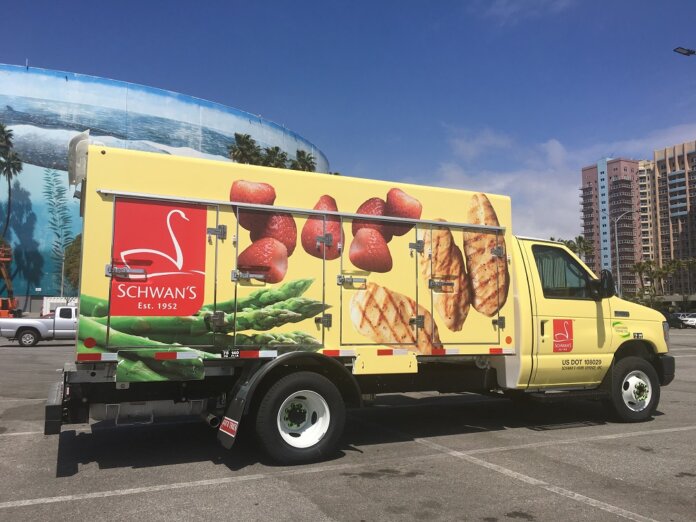To hear David Mann put it, Schwan’s Home Delivery was green before it was fashionable to be green – all due to its commitment to propane autogas.
Mann, Schwan’s Home Delivery’s senior director of fleet operations, says the frozen grocery delivery company has been using propane autogas delivery trucks since the 1970s. Back then, during the first U.S. energy crisis, company founder Marvin Schwan came to his fleet team and told it to find an alternative to gas and diesel.
That alternative was propane, and today, the company operates in excess of 3,000 delivery trucks, with 76% powered by propane.
“We have 304 locations nationwide, and they’ll use anywhere from eight to 20 trucks,” Mann says. “A couple depots don’t have propane currently, but we are committed to buying more propane vehicles.”
The old days: Vapor-injected system
Mann says that when Schwan’s Home Delivery first began using propane delivery trucks, the fuel system was vapor-injected. In such a system, liquid propane would travel along a fuel line into the engine compartment, where it was converted to a vapor by going through a mixer. This process ensured the propane was vaporized before it proceeded to the carburetor.
The challenge with a vapor-injected system is that the vapor itself and the mixer could freeze in lower temperatures, not allowing the vehicle to start or run smoothly, or even cause a misfire.
“Those trucks were tough in the wintertime,” Mann recalls. “The boiling point of propane is minus-44 degrees, but once you get below freezing, it doesn’t work as well. It had to warm up the propane so it would go into the carburetor. Because propane has less BTUs than gas or diesel, there was a big dropoff with the vapor system. You’d lose 12 to 15 percent horsepower.”
New and improved: Liquid-injected system
Mann is quick to point out that it’s not that those propane vehicles were unreliable – but they were definitely “more finicky.” But like the automobile industry, technology pushed the envelope for propane fuel systems and led to the development of liquid-injection fuel systems in the 1990s.
With modern propane systems, like those used by Mann’s fleet at Schwan’s Home Delivery, the fuel remains in a liquid state until it arrives at the cylinder. That allows for more precise control of the fuel delivery. The result is improved engine performance and efficiency.
It also alleviates the cold-start issues that were associated with vapor technology. Current propane fuel systems provide unaided cold weather starts to -40 degrees Fahrenheit, which has improved vehicle startups and has the added benefit of reducing time and labor costs needed on those frigid days.

What’s more, the air-to-fuel ratio was not as exact with a vapor-injected fuel system, which means a truck didn’t get as much beneficial cooling as it achieves with a liquid-injected system. A liquid-injected system runs exact fuel ratios at any temperature. The result is a good startup in very cold, and also very hot, weather.
Propane engine manufacturers are now able to calibrate an engine to make the exact horsepower and torque as it would if it were running on gasoline. This is possible only because of liquid injection. There are also more advanced electronic controls on a liquid-injection system, which allows for things like the opening and closing of valves at certain times, which leads to system durability and better startup quality.
Fueling and cost savings
Today’s engines powered by propane have a major leg up on their diesel counterparts. They require less oil per oil change than diesel (7 quarts vs. 17 – 30 quarts), and no additional diesel emissions fluids or hardware.
Propane vehicles also eliminate the need for particulate trap systems, EGR systems, and turbochargers and intercoolers. Filter packages cost about 60% less on propane autogas vehicles than diesel vehicles.
But the big savings for Mann is the fuel itself. Propane autogas costs about 50 percent less than diesel. When you’re buying 9 million gallons of fuel per year, like Mann is, the savings stack up quickly. Many fleet managers report that propane provides the lowest total cost of ownership compared with all other fuels.
Fueling is another area that has been seamless for Schwan’s Home Delivery. Mann says the company has an onsite fueling infrastructure – which includes a propane tank and a dispenser – at almost every one of its locations. There is usually one dedicated staff person that refills the trucks, which is accomplished each night.
That’s another example of the emissions savings from Schwan’s Home Delivery propane autogas trucks, says Mann, not to mention the convenience.
“It’s easy,” he says. “We don’t have to have our drivers waiting in line at a gas station.”
It’s also significant to note that Schwan’s Home Delivery propane vehicles help the company achieve its sustainability goals, which makes it a better corporate citizen. Fleet vehicles that run on propane autogas emit fewer greenhouse gases and smog-producing hydrocarbons, and they virtually eliminate particulate emissions.
The future
What does the future look like for Schwan’s Home Delivery and propane vehicles? It’s bright.
Mann says the company is always testing new technology, which is why it will probably never be 100% propane-powered, but he predicts it will get close.
Another area of interest to Mann is renewable propane, or biopropane, which is developed from renewable feedstocks like animal fats and cooking oils and is identical to conventional propane, which is a byproduct of natural gas processing and, to a lesser extent, oil refining.
The challenge with renewable propane is that it’s limited right now, but “it’s definitely something I keep an eye on,” Mann says. “It’s definitely something we would explore.”
He notes that a lot of the kinks related to propane vehicles have been ironed out by Schwan’s Home Delivery. That’s to say the combination of liquid-injection fuel systems, ease of refueling and especially its low-emission qualities mean it will be the fuel of choice for Schwan’s Home Delivery for the foreseeable future.
“Propane isn’t the propane of the past, from the 1980s and 1990s,” Mann says. “It’s a technologically advanced system, and it helps the environment. It’s been a good fuel type for many, many years, and we’re committed to it to this day.”
Todd Mouw is president of ROUSH CleanTech, an industry leader of advanced clean transportation. Mouw has also served as president of the NTEA Green Truck Association. To learn more, visit ROUSHcleantech.com.







